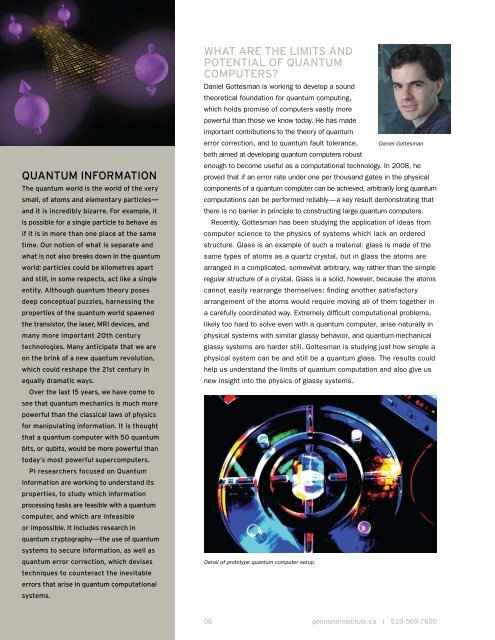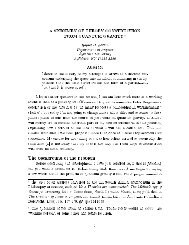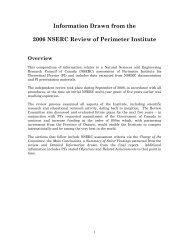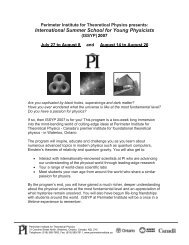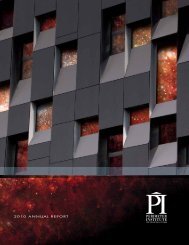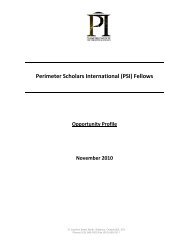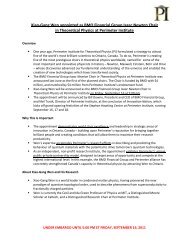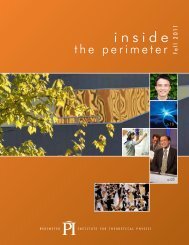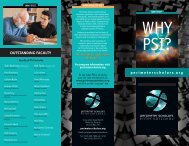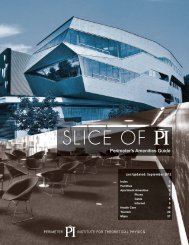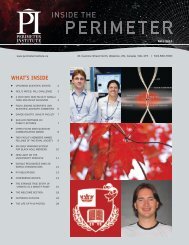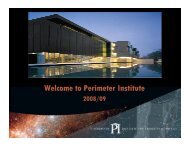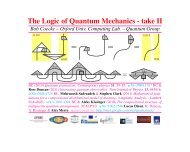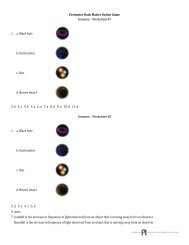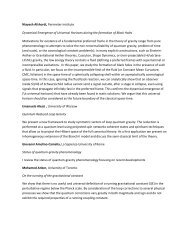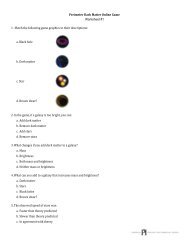2009 Annual Report - Perimeter Institute
2009 Annual Report - Perimeter Institute
2009 Annual Report - Perimeter Institute
Create successful ePaper yourself
Turn your PDF publications into a flip-book with our unique Google optimized e-Paper software.
Quantum InformATION<br />
The quantum world is the world of the very<br />
small, of atoms and elementary particles—<br />
and it is incredibly bizarre. For example, it<br />
is possible for a single particle to behave as<br />
if it is in more than one place at the same<br />
time. Our notion of what is separate and<br />
what is not also breaks down in the quantum<br />
world: particles could be kilometres apart<br />
and still, in some respects, act like a single<br />
entity. Although quantum theory poses<br />
deep conceptual puzzles, harnessing the<br />
properties of the quantum world spawned<br />
the transistor, the laser, MRI devices, and<br />
many more important 20th century<br />
technologies. Many anticipate that we are<br />
on the brink of a new quantum revolution,<br />
which could reshape the 21st century in<br />
equally dramatic ways.<br />
Over the last 15 years, we have come to<br />
see that quantum mechanics is much more<br />
powerful than the classical laws of physics<br />
for manipulating information. It is thought<br />
that a quantum computer with 50 quantum<br />
bits, or qubits, would be more powerful than<br />
today’s most powerful supercomputers.<br />
PI researchers focused on Quantum<br />
Information are working to understand its<br />
properties, to study which information<br />
processing tasks are feasible with a quantum<br />
computer, and which are infeasible<br />
or impossible. It includes research in<br />
quantum cryptography—the use of quantum<br />
systems to secure information, as well as<br />
quantum error correction, which devises<br />
techniques to counteract the inevitable<br />
errors that arise in quantum computational<br />
systems.<br />
What are the limits and<br />
potential of Quantum<br />
computers?<br />
Daniel Gottesman is working to develop a sound<br />
theoretical foundation for quantum computing,<br />
which holds promise of computers vastly more<br />
powerful than those we know today. He has made<br />
important contributions to the theory of quantum<br />
error correction, and to quantum fault tolerance, Daniel Gottesman<br />
both aimed at developing quantum computers robust<br />
enough to become useful as a computational technology. In 2008, he<br />
proved that if an error rate under one per thousand gates in the physical<br />
components of a quantum computer can be achieved, arbitrarily long quantum<br />
computations can be performed reliably—a key result demonstrating that<br />
there is no barrier in principle to constructing large quantum computers.<br />
Recently, Gottesman has been studying the application of ideas from<br />
computer science to the physics of systems which lack an ordered<br />
structure. Glass is an example of such a material: glass is made of the<br />
same types of atoms as a quartz crystal, but in glass the atoms are<br />
arranged in a complicated, somewhat arbitrary, way rather than the simple<br />
regular structure of a crystal. Glass is a solid, however, because the atoms<br />
cannot easily rearrange themselves; finding another satisfactory<br />
arrangement of the atoms would require moving all of them together in<br />
a carefully coordinated way. Extremely difficult computational problems,<br />
likely too hard to solve even with a quantum computer, arise naturally in<br />
physical systems with similar glassy behavior, and quantum-mechanical<br />
glassy systems are harder still. Gottesman is studying just how simple a<br />
physical system can be and still be a quantum glass. The results could<br />
help us understand the limits of quantum computation and also give us<br />
new insight into the physics of glassy systems.<br />
Detail of prototype quantum computer setup.<br />
06 perimeterinstitute.ca I 519-569-7600


